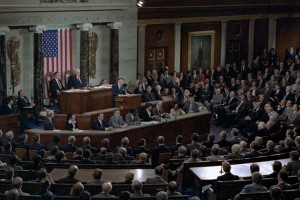In the aftermath of the Supreme Court’s ruling on same-sex marriage, two lines of response may be open to those who are committed to a serious effort to resist and overturn that decision. The first and most direct line is to come forth with a statute that seeks to limit or even challenge the substance of the decision. This is what Lincoln and his Congress did in response to the decision in the Dred Scott case. Lincoln did not wait for appointments to the Supreme Court before seeking to make a nullity of that decision. On that, we will hear more later.
But a second path is to move quickly now to the side of those who are most directly and gravely challenged: the religious schools, hospitals, charitable organizations that refuse to recognize same-sex marriages in their benefits, or in the arrangements made, say, for “married students.”
With an apt sense of the moment, Sen. Mike Lee of Utah has filed a bill in that vein, the “First Amendment Defense Act.” The bill was cast in terms of the First Amendment in order to pick up the theme of protecting religious freedom. The bill was also cast solely as instrument to protect people against the agencies of the federal government. They may be employers ordered by a federal agency to cover same-sex couples in their medical plans. Or the action could come from a federal court upholding such a claim against employers under federal law.
But one thing should be noted: Sen. Lee’s bill, as it is cast now, will not do anything to help those schools and businesses that are faced with serious penalties under State and local laws for the refusal to recognize same-sex marriages.
Sen. Lee’s bill is cast as protection of religious freedom, with its invocation of the First Amendment, but there is a recognition in the bill that the law may have to extend its protections beyond the circle of the religious. The problem here was posed in this way in the cases on Obamacare and abortifacients. There are many people who have reasoned their way to their opposition to abortion on the same grounds of moral reasoning used by the Church, without invoking faith or belief. The Religious Freedom Restoration Act (RFRA) cast its protections only on people animated by “sincere” religious “beliefs.”

And so the question had to arise: When the Supreme Court protected the Green family in Hobby Lobby from the obligation to fund abortifacients for their employees, would the same freedom not be won by the employer who had formed the same moral judgment but invoked no “religious beliefs”?
It was curious, to say the least, that this problem was already anticipated by Justice Anthony Kennedy in his opinion in the Obergefell case:
The First Amendment ensures that religious organizations and persons are given proper protection as they seek to teach the principles that are so fulfilling and so central to their lives and faiths, and to their own deep aspirations to continue the family structure they have long revered. The same is true of those who oppose same-sex marriage for other reasons. (Italics added)
Reflecting that understanding – and reflecting it more fully – Sen. Lee’s bill bars the federal government from taking “discriminatory action against a person. . .on the basis that such person believes or acts in accordance with a religious belief or moral conviction [italics added] that marriage is or should be recognized as the union of one man and one woman, or that sexual relations are properly reserved to such a marriage.”
It is a tricky matter, to say the least, to excuse people from the obligation to obey a law when they claim a “moral objection” to it. But it could be useful to recall the most instructive precedent for this move, with the Civil Rights Restoration Act of 1988. The Congress sought to overcome a decision by the Supreme Court and insist that if any student in a university received federal aid, all federal regulations would come into play for all parts of the school.
This jolting possibility then arose: A student at Georgetown University receives a federal loan, and Georgetown may not bar in its hospital a surgery performed only on women, the surgery called “abortion.” There was an attempt deal with the problem first by offering an exemption for religious institutions. But then Senator Heinz of Pennsylvania noted that, in his State, 240 hospitals out of 380 were community hospitals not affiliated with any religion. Only 40 of them housed abortions. The other 200, he said, “have chosen for moral reasons not to perform or fund abortions.”
The decision was made then to “fix” the problem with a simple amendment offered by Senator Danforth of Missouri: “Nothing in this title shall be construed to require or prohibit any person, or public or private entity, to provide [any benefits, services, or facilities] related to an abortion.”
And that was that. But strictly speaking a “law” seeks to forbid what is wrongful and enjoin what is rightful. Anything claiming the standing of law will require a moral ground to show why it is “justified.” To grant an exemption on moral grounds from a policy proclaimed by the Supreme Court is a way in which Congress can still make the point that the Court got something strikingly wrong. And that is a good start.














